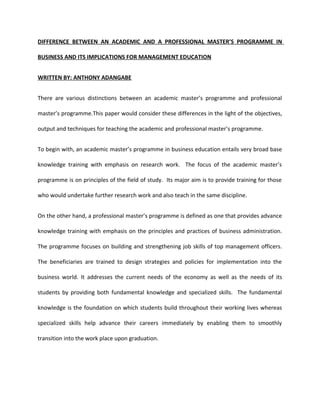Difference between an academic and professional masters programme
- 1. DIFFERENCE BETWEEN AN ACADEMIC AND A PROFESSIONAL MASTERŌĆÖS PROGRAMME IN BUSINESS AND ITS IMPLICATIONS FOR MANAGEMENT EDUCATION WRITTEN BY: ANTHONY ADANGABE There are various distinctions between an academic masterŌĆÖs programme and professional masterŌĆÖs programme.This paper would consider these differences in the light of the objectives, output and techniques for teaching the academic and professional masterŌĆÖs programme. To begin with, an academic masterŌĆÖs programme in business education entails very broad base knowledge training with emphasis on research work. The focus of the academic masterŌĆÖs programme is on principles of the field of study. Its major aim is to provide training for those who would undertake further research work and also teach in the same discipline. On the other hand, a professional masterŌĆÖs programme is defined as one that provides advance knowledge training with emphasis on the principles and practices of business administration. The programme focuses on building and strengthening job skills of top management officers. The beneficiaries are trained to design strategies and policies for implementation into the business world. It addresses the current needs of the economy as well as the needs of its students by providing both fundamental knowledge and specialized skills. The fundamental knowledge is the foundation on which students build throughout their working lives whereas specialized skills help advance their careers immediately by enabling them to smoothly transition into the work place upon graduation.
- 2. Another area of difference is that, the graduates of the academic masterŌĆÖs programme are expected to make significant contributions to the advancement of knowledge of business practices through applied research, teaching and consulting. It is also designed to provide the graduates with in-depth exposure to a specific business content area and sophisticated analytical methods of training. Whilst, the professional masterŌĆÖs programme is geared towards equipping graduates with managerial and decision-making skills. To illustrate further, in the field of academic masterŌĆÖs programme where the programme preoccupation is the development of models to assist in the transformation of the business sector, the focus of training would be to understand the ŌĆ£why and the why notŌĆØ of business theories in the business world. For example: Why does the demand curve have a negative slope? Also, the academic masterŌĆÖs in business may want to understand the principles behind the elasticity of demand and further research to discover modern trends and exception to this economic model. However, the professional masterŌĆÖs programme would majorly focus on the ŌĆ£howŌĆØ, the ŌĆ£whatŌĆØ and the ŌĆ£whenŌĆØ of academic theories propounded in the world of business. For example: What decisions should a manager take or not take as a result of the impact demand curve? The professional masterŌĆÖs programme would be mainly concerned with corporate decisions and plans to adopt considering the elasticity of demand of their products and services. The distinction between an academic and professional masterŌĆÖ programme would provide personnel the opportunity to research further into development and make improvements to
- 3. the business sector, while allowing personnel to implement these research findings. The impact on management is presented in a diagram below: ŌĆś THE RELATIONSHIP BETWEEN ACADEMIC AND PROFESSIONAL MASTERŌĆÖS PROGRAMME RESEARCH TEACHING EVALUATION CONSULTING FINDINGS IMPLEMENTATION The academic masterŌĆÖs programme would provide research for the business world and in turn teach the professional masterŌĆÖs graduates findings and models for implementation to enhance the business world. Again the professional masterŌĆÖs programme would implement and report for evaluation on the viability of models discovered. Even when implementing financial models, the academic masters would still provide needed consultancy to ensure research findings are well implemented. ACADEMIC MASTER'S COURSE BUSINESS WORLD BUSINESS WORLD PROFESSIONAL MASTERŌĆÖS COURSE
- 4. Based on the information above, one can conclude that the academic masterŌĆÖs serves as a research tool for the business world for its development and growth whereas, the professional masterŌĆÖs programme serves as an avenue for experimentation and implementation of the research findings by the academic world. REFERENCES: 1. www.ghanaweb.com 2. www.wikipdia.com 3. www.gimpa.edu.org




